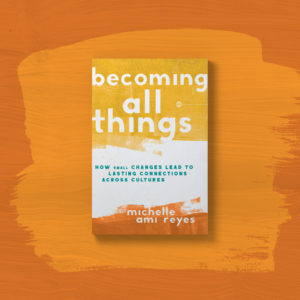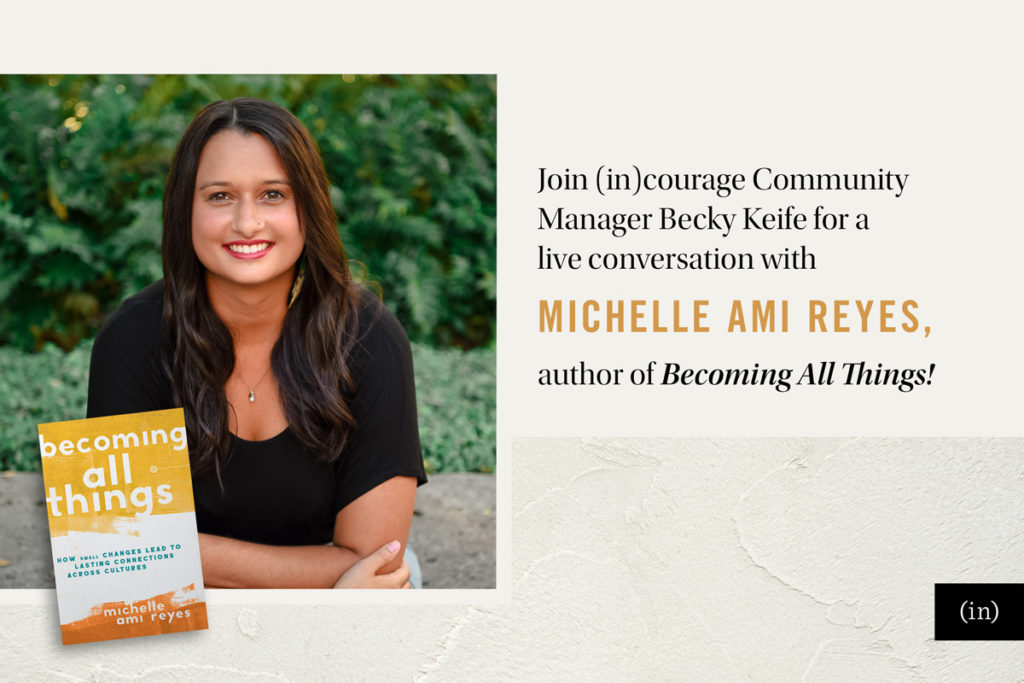Not long after my husband and I got married and settled into our apartment in Chicago, we befriended a couple who had recently moved to the U.S. from Iran. The first time we met, we barely spoke because they didn’t know much English and we didn’t speak Farsi. In fact, the first time we went over to their apartment to hang out, conversation was still relatively sparse. We sat around a small television, watching a soccer game, and trying at times to make comments about anything — the game, church, school — but without much success. To be honest, after that first hangout, we hadn’t covered much relational ground. The differences in our cultures and languages meant there were more moments of dissonance and confusion than true understanding.
As my husband and I drove back home, we remarked about how hard cross-cultural relationships can be. It’s hard not to make deep connections right away. It’s hard not to understand the other person, and it’s just as hard to feel misunderstood. Sometimes, when we put ourselves out there, we make ourselves vulnerable to being hurt, rejected, sometimes even shamed. However, if we both hadn’t persevered, we would have missed out on a rich and beautiful friendship.
Each subsequent time the four of us met up, we learned more about each other. Our new friends would teach us phrases in Farsi. When we went to their home, they would make us homemade Persian food. Likewise, when they came to our apartment, we would make either Indian or Mexican food. Eventually, we also met each other’s friends. One evening over dinner we laughed until our sides hurt at the ways our mannerisms had begun to mimic each other. We’d spent so much time together that we had started to talk and act like each other too.
It takes a lot of work to connect across cultures. We could have easily quit and said, “This is too hard.” It’s easy to find excuses to let acquaintances or even friendships slide. We choose not to follow-up with another dinner invitation, or we don’t call the other person back because the last interaction was awkward or even frustrating. Sometimes we blame busyness or scheduling conflicts. But real relationships that are deep and that lead to healing across cultures take time and energy. They are also costly because much is required of us.
I love the way the Apostle Paul puts it in 1 Corinthians 9:22 when he writes, “I have become all things to all people so that by all possible means I might save some.” This has become a life verse for me and a guide to connecting across cultures. These words in Scripture are an invitation to grow, change, and adapt who we are to connect with the people around us. My husband and I persisted with our Persian friends because we valued them as people and genuinely wanted to be friends. More importantly, we were willing to change and adapt ourselves to each other for the sake of our relationship. As a result, this couple is now dear, life-long friends.
Becoming all things to all people is also the model of Jesus. Jesus came to this earth as a brown-skinned, first-century Jewish man. The eternal Son of God transformed Himself, despite pain and hardship, to meet us on our terms. He embraced another nature to become like those He loved and navigated different languages (Aramaic and Greek) as well as different sociopolitical contexts (Jewish and Roman). He adapted to human culture, acquired our customs, languages, and pains in order to care for, heal, save, and unite us. Salvation was His goal, but the first step in saving us was crossing into our world and meeting us where we lived.
Jesus invites all of us to go on a journey of becoming all things to all people. The word becoming is a process of coming to be something. It’s a word that connotes change — changing who we are to connect with the people around us. To become all things to all people is not a code for appropriating or stealing other people’s cultures. Becoming all things to all people is a posture that desires to see the world through other people’s eyes, value what they value, and both center and honor their way of life. It’s also a posture that requires humility and flexibility.
The journey of becoming all things will stretch us and make us uncomfortable at times. It won’t be easy, but I promise it is worth it. No matter who we’re seeking to connect with, we can take it slow, knowing that Jesus is with us every step of the way.
 Cultural identities and cross-cultural engagement are not things that anyone can choose to ignore anymore, least of all Christians. Many of us want to have diverse friends and are passionate about justice. But if we are serious about cross-cultural relationships — real relationships that lead to understanding, healing and solidarity across cultural lines — we need to be willing to change. And that’s not something that comes easy for any of us. In Becoming All Things: How Small Changes Lead to Lasting Connections Across Cultures, Michelle offers hope by showing what’s possible when all of us are willing to try something new.
Cultural identities and cross-cultural engagement are not things that anyone can choose to ignore anymore, least of all Christians. Many of us want to have diverse friends and are passionate about justice. But if we are serious about cross-cultural relationships — real relationships that lead to understanding, healing and solidarity across cultural lines — we need to be willing to change. And that’s not something that comes easy for any of us. In Becoming All Things: How Small Changes Lead to Lasting Connections Across Cultures, Michelle offers hope by showing what’s possible when all of us are willing to try something new.
Click here to purchase a copy for yourself. And for an extra copy to give to a friend, tell us who you’d like to give it to in the comments below — we’ll be choosing THREE winners!*
Then, tune in tomorrow, April 26th, at 1:00 pm CST on Facebook for a live conversation with Michelle Reyes and Becky Keife as they discuss this beautiful new book.








My son fell in love with a young Indian girl who was American. They went through school together and connected after college. She came to our house but my son was not welcome at her house. They had to sneek around or she had to hide where she was going to be, so they could be together. She was a pharmacist and my son a CPA, so they were definitely adults, but she lived with her family where she grew up. Her father was the head of the household as is the custom, and forbid her to see my son when he found out they were getting serious. So their love was crushed by the Indian father and her mother wasn’t allowed to have a say. So my son moved on and the young lady moved out of her family home to another state to start over. She had to go through counseling and my son met another young lady who is Greek. A Greek orthodox wedding followed for him which is a Christian faith but a different form of worship. Sometimes crossing cultures does not work and for this young couple, it was not allowed to work.
Connie, I’m so sorry this happened to your son. When I was in high school, my dad refused to let me go on a date with a white boy who asked me out. That was a hundred years ago–or so it seems. So, I have forgiven my late dad and the times that led to such decisions. Now, it’s our turn. We can do better and be better.
I’m so grateful for Michelle Reyes’ wonderful book and brave voice that help teach us how to cross cultural barriers–finding God in everyone. It’s an exciting journey! Blessings today with love.
Thanks so much for your reply. Parents used to have ultimate authority in their families and my mother taught me to only date the same color of skin and the same faith for the happiest marriage. There definitely is truth to that teaching too. I am 73 now and still honor my happy childhood but only remember that schools were segregated, as were churches, medical Drs. offices. The world keep changing by the day and this year has been a year of pandemic virus, racism, crime, hatred, anger, and violence. I keep praying to God for direction and He is ultimately in control.
Yes, I remember when parents taught those things. Now, however, I have a white son-in-law–our youngest daughter’s husband. He’s kind, attentive, a great husband and dad, fun to be around, and looks out for my husband and me. We really enjoy his side of the family, too.
The Lord has shown me that He’s not worried about something so superficial as skin color–or even different cultures. When Jesus spoke in broad daylight to the Samaritan woman, He was teaching all of us that love knows no cultural boundaries.
I’ve had to unlearn a lot of the hate I learned growing up. I was born in a segregated hospital and I’ve faced racial prejudice and discrimination my entire life. (And I’m a quiet, everyday person. What threat do I even present?) But God is greater! Through Michelle, He allowed you and me to connect today. For Him, I am grateful! Much peace and love!
Sounds like a wonderful book and so needed for such a time as this!! I would give the book to my Bestie, who also loves ALL people. We always strive in include others. I learned this early on growing up an “Army child” and living in other countries. Thank you for the important reminder to always love others. ❤️❤️❤️
Michelle, this sounds like an exciting concept to explore. Bravo to you and your hubby for being brave and reaching out! And look at the rewards! I would very much like to explore this issue by reading your book. P.S. When I first saw the title, I thought, ” Wait a minute! We aren’t supposed to conform to the world or try to emulate other people!”. But I see this is a completely different endeavor from that.
Michelle, congrats on your new book! This is such a helpful perspective: “Becoming all things to all people is a posture that desires to see the world through other people’s eyes, value what they value, and both center and honor their way of life. It’s also a posture that requires humility and flexibility.” Oh to be more like Jesus. How the world would change if/when we’re ready to change for the sake of loving others and entering into their beautiful lives. I think my mom would really appreciate a copy of Becoming All Things!
Michelle, I am so excited for you and proud of you—and I’m really looking forward to reading your book! I’ve learned so much from you, and am grateful for your wisdom, grace, and generosity. (And patience. I know I’m slow to learn some of these things.) Congratulations, friend!
Michelle,
Thank-you for sharing this beautiful concept with us, congratulations on your book.
Blessings to all,
Penny
That was such a beautiful, relevant and valuable devotional and life-lesson. Thank you for speaking to my heart today.
Thank you Michelle for this beautiful message….AND reminder of how important our relationships are! My husband and I have some dear friends we’ve “stepped back” from because they are in a “different season of life” than we are. They are now blessed with new grandbabies and they are “all in” to the moon and back! We too have grand kids, but they are older and farther away.
I admit we don’t call as much or invite them out as much as we used to because they are “busy or have plans with family”. Yes we send a text or they send pics but it’s not us coming together “over dinner laughing until our sides hurt” and only we can change that even if it’s hard. There will be a “YES lets get together” we just have to keep doing the work because they are worth it, important and we love them!
Congrats on your new book Michelle!!!
I have several friends in Knoxville who advocate for coming together. They would love this book!
This reflects our family and our values. We have lived in other countries we have had International students live with us and we love to cross cultures. It is not always easy but always educational and usually Joy filled.
My copy of ‘Becoming All Things’ arrived TODAY!! I love the colors of the book jacket and I am excited to dive into the pages and soak in your words. Thank you so much for sharing your wisdom and love in the way that Jesus did/does.
I sincerely appreciate your voice.
Shalom
LCB
Michelle,
Thank you for writing this much needed book. Wishing everyone would read the words & soak up your God given wisdom. It is time we Christians broke down barriers, & stereotypes. We need to be more like Jesus & value people for who they are not their skin color or race. If we all did that we just might make wonderful friendships & learn a thing or two in the process.
Blessings 🙂
I’d give a copy to my oldest daughter. She is all about developing relationships with others who do not share the same beliefs or customs. She is currently an elementary educator.
This is so powerful. I love the idea that we need to be willing to change to make deep connections with others.
Also I really loved this:
“Salvation was His goal, but the first step in saving us was crossing into our world and meeting us where we lived.”
This book sounds incredible!
I have a friend who I’d like to give it to:)
Michelle, I’m grateful for your words here and in this book. I always learn so much through your honest personal stories and practical suggestions. My book arrived at my house tonight, and I’m brimming with excitement to actually hold it and dig in! Big congrats to you on this! The world needs your words, especially now. For His glory!
I would give it to my friend Lindsay!
Sounds like a great book to read! I would give it to my grown daughters.